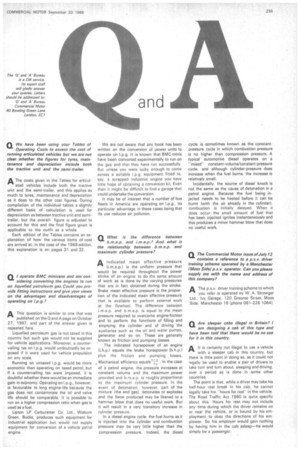Q What is the difference between b.m.e.p. and i.m.e.p.? And what is the relationship between b.m.e.p. and maximum cylinder pressure?
Page 259

If you've noticed an error in this article please click here to report it so we can fix it.
A Indicated mean effective pressure
(i.m,e.p.) is the uniform pressure that would be required throughout the power stroke of an engine to do the same amount of work as is done by the varying pressures that are in fact obtained during the stroke. Brake mean effective pressure is the proportion of the indicated mean effective pressure that is available to perform external work at the flywheel. The difference between i.m.e.p. and b.m.e.p. is equal to the mean pressure required to overcome engine friction and to perform the functions of filling and emptying the cylinder and of driving the auxiliaries such as the oil and water pumps, generator and so on. These are generally known as friction and pumping losses.
The indicated horsepower of an engine (i.h.p.) equals the brake horsepower (b.h.p./ plus the friction and pumping .losses.
, Mechanical efficiency equals %... In the case of a petrol engine, the pressure increases at constant volume and the maximum power provided and b.m.e.p. is roughly proportional to the maximum cylinder pressure. In the event of detonation, however, part of the mixture (the end gas). detonates or explodes and the force produced may be likened to a hammer blow that does no useful work. But it will result in a very transitory increase in cylinder pressure.
In a diesel engine cycle, the fuel burns as it is injected into the cylinder and combustion pressure may be very little higher than the compression pressure. Indeed, the diesel cycle is sometimes known as the constantpressure cycle in which combustion pressure is no higher than compression pressure. A typical automotive diesel operates on a "mixed" constant-volume/constant-pressure cycle and although cylinder-pressure does increase when the fuel burns, the increase is relatively small.
Incidentally, the source of diesel knock is not the same as the cause of detonation in a petrol engine. Because the fuel being injected needs to be heated before it can be burnt (with the air already in the cylinder), combustion is initially delayed. When it does occur the small amount of fuel that has been injected ignites instantaneously and this produces a minor hammer blow that does no useful work.


















































































































































































































































































































































































